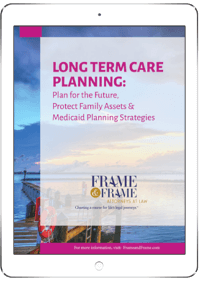Getting older and facing extensive healthcare costs is an experience that many seniors in Maryland face. Hospital visits become more frequent, and older adults often require more prescription medications. However, just because many Maryland residents need to think about Medicaid benefits and long-term care does not make this process any easier. To be sure, elderly adults face specific legal issues surrounding Medicaid benefits and long-term care, often in nursing homes or assisted-living facilities in the state. Many Maryland residents worry that they could end up requiring care in a skilled nursing facility and that they will not have the assets to pay for it.
It is extremely important to begin thinking about Medicaid planning long before you need to rely on these benefits to pay for care in a nursing home. At the same time, if you or your spouse unexpectedly becomes ill and needs to stay in a skilled nursing facility, it is not too late to work with a Maryland Medicaid planning attorney to help you pay for what you need while protecting your hard-earned assets. Contact the law firm of Frame & Frame today to learn more about how we assist Maryland residents with a wide variety of estate planning needs.
What is Medicaid Planning?
What is Medicaid? It is a federal-state healthcare program. Many Maryland residents have heard that Medicaid is a program for low-income and otherwise needy individuals. While this is true, it is also a healthcare program for older adults that helps to pay for the following:
- Costs of hospitalization;
- Physician and other outpatient medical services (like doctor’s visits, lab services, and medical equipment, for example);
- Medicare Advantage Plan; and
- Prescription drug costs.
There are more than 4.6 million seniors who currently benefit from Medicaid, especially when it comes to paying for long-term care. A Maryland Medicaid planning attorney can explain in more detail how Medicaid may be able to benefit you.
Why Are More People Considering Medicaid Planning?
- Rising Cost of Healthcare: The U.S. spends well over $3 trillion on healthcare each year, with the cost of healthcare rising faster than the rate of inflation at 5.8 percent in 2015 alone, according to Morgan Stanley. In 1960, the cost of healthcare was just five percent of the national economy, while today it is 18 percent and by 2025 it is projected to be 20 percent, according to CNN Money.
- Older Population: An aging population means that an increasing percent of the population will be living in assisted living, independent living, or nursing homes. Nowadays, just 15 percent of the population is over 65, but by 2060, 23 percent of the population will be, according to the S. Census Bureau. Nearly 100 million Americans will be over 65 by 2060, almost twice the number that currently are. While the average life expectancy has only recently stagnated in the U.S., advances in medicine are expected to keep people living longer than ever before in the future.
The Basics of Medicaid Planning
Medicaid is a federally funded healthcare program that many people associate with low-income families. However, you do not need to be low-income to qualify for Medicaid benefits that pay for long-term senior care. You do, however, need to create a Medicaid planning trust that sets aside your assets and reduces your net worth. The assets in this trust can be used for all of your basic needs like transportation, food, vacation, clothing, etc., while Medicaid pays for your care expenses such as:
- Hospitalization;
- Prescription drugs;
- Outpatient services;
- Nursing home care; and
- More.
Why Do I Need to Think About Medicaid Planning?
Many Maryland residents might be wondering why they need to speak with an estate planning lawyer about Medicaid planning. In short, care in a skilled nursing facility can be extremely expensive, and many seniors to do not plan in advance for the costs associated with long-term care. To be sure, the median cost of nursing home care in Maryland is more than $101,000 per year. What is involved in Medicaid planning?
In short, you may need to spend down your assets and savings in order to qualify for Medicaid. There are ways to do this that can allow you to protect some of your assets for your partner, as well as for your children and other loved ones. Unless you speak with an estate planning lawyer, you may not be able to protect some of your assets, and worse, you could be penalized if you transfer assets in a manner that is not allowed under Medicaid rules.
Learn More from a Maryland Medicaid Planning Attorney
Many residents of Maryland will end up relying on skilled nursing home care, or living in an independent or assisted senior living facility. For many, the biggest hurdle is giving up a part of their independence. For many others, simply being able to afford this type of care is questionable. This is a real and common fear for any older person to have, regardless of their income. After all, a nursing home stay can costs anywhere from a six or seven thousand to tens of thousands of dollars per month. Spending one year in an average Maryland nursing home costs over twice as much as a year of tuition at Harvard. How is it even possible to afford this type of high-quality care without going bankrupt? Fortunately, there are ways to plan for long-term care, either in a nursing home or other assisted living facility, that do not require you to give up every hard-earned penny in you savings and retirement accounts. An experienced Maryland Medicaid planning attorney with Frame & Frame can provide more information.





